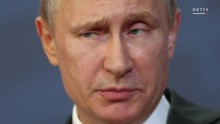Vladimir Putin, and Muscovites, hope Donald Trump will be a friend to Russia
Nine days before the US presidential election, Russian TV anchor Dmitry Kiselev ranted about America's "democracy:" Millions of "dead souls" voting! Voters bused around a city, casting ballots eight to ten times! Biggest scandal in history!
This week, Kiselev barely mentioned the US, although he did take a few digs at the "West" for its "boorishness" and "arrogance."
Donald Trump's victory stunned Russia's state-controlled media. They had overwhelmingly supported Trump but, for months, insisted the American system was so "fixed," so corrupt, that an outsider simply had no chance of being elected.
When the impossible happened, the Russian propaganda machine temporarily froze, then pivoted, admitting that maybe, just maybe, this time the "people" had beaten the system.
With Trump on his way to the White House, the tone in Moscow is now cautiously hopeful that Trump will follow through on his positive words about Russian President Vladimir Putin, and might even become an ally.
READ MORE: Russia pledges to improve US relations
Less unease over US
Channeling Trump's earlier "Wouldn't it be nice if we got along with Russia?" comments, Putin this week insisted, reassuringly, "We don't look for enemies and have never done so. We need friends."
And he's made it official: Donald Trump is, in his view, "smart."
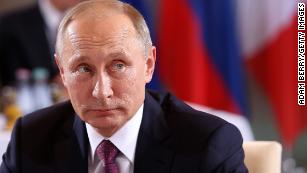
Putin signals he wants to work with Trump
"Since he was successful in business, this proves he is a smart person," Putin said in an interview last week with Russia's NTV. "As a smart person, he's able to come to grips quickly with another level of responsibility and we expect him to act with this stance in mind."
Many of Putin's fellow Russians seem to be taking their cue from him, and from the media that exhaustively cover his remarks.
Ekaterina and Stanislav, both young IT specialists, were wheeling their baby Victoria -- bundled up against the cold -- down Kamergersky street in downtown Moscow.
"I really do think there's hope that relations will get better," Ekaterina told me. "There's no reason to be enemies. Absolutely none! It's better to be friendly, respect each other, because we're all human beings. And if this tension disappears, that would be fantastic - for everyone!"
Stanislav said he's seeing less unease about the US in the news.
"Because there's hope, that's why there's less tension. Everyone is expecting that something good will happen."
READ MORE: Trump, Putin talk about future links
Positive media portrayal
A new poll by the Levada Center suggests more than half of Russians think relations with the US will improve under a Trump presidency.
Another Levada Center poll, published in the financial newspaper RBK, says the number of Russians who want better relations with the West is at its highest -- 71% -- since March 2000, the start of the Putin presidency, when 76% expressed that opinion.
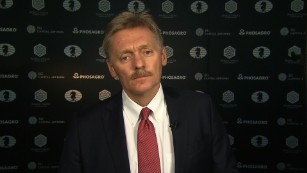
Russia: We're ready to develop good ties with Trump
That's a big change from a year and a half ago; a July 2015 poll found only 50% of Russians wanted closer ties. Moscow, at that point, was struggling against economic sanctions imposed by the US and Europe in response to its annexation of Crimea.
One explanation for the improvement, according to Levada Center assistant director Alexey Grazhdankin, is the Russian media's positive depiction of Donald Trump.
"People in television are savvy," says Maria Lipman, editor-in-chief of Counterpoint Journal. "They know very well how to tune their instrument, which happens to be the Kremlin's major political resource, how to tune it to further the Kremlin's interests in the best possible ways."
Lipman says it's like a tap -- you can turn it on and off: "More anger, less anger. They can switch from one focus to another, they can play down any subject they want to, or boost it, or ignore something. This is an instrument that is fully pliable and flexible in the hands of the top managers and senior editors of national television."
Moscow's message to its people, she says, is not just that America is bad, but that the Obama administration is to blame, "which, indirectly, maybe suggests that the next administration will be better."
READ MORE: Kremlin says Trump could fix 'lousy' US ties
Putin: It's not our fault
It's America, not Russia, that has to change, according to Moscow. As President Putin himself has said many times: "It's not our fault" that relations are bad.
Back out on Kamergersky street, Stanislav agrees with Putin: "To a great degree it's the fault of American politicians because they are pretty aggressive as a whole and we're taking a defensive reaction," he told me. "But I think we're open for a dialogue."
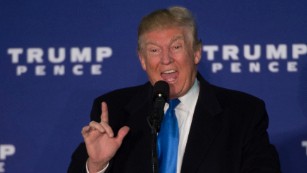
Putin details conversation with Donald Trump
Anti-Americanism has been kept at fever pitch for almost three years, ever since Russia's annexation of Crimea and the West's angry response. Some Russians we spoke with seemed relieved that the pressure might be easing.
"We were really worried," Tatyana, a retired woman from Moscow, told me. "We wanted it to be Trump. Relations will get better."
The tone, from the Kremlin and from the media, Lipman says, is more hopeful "but in their [the Kremlin's] own deliberations, I think they are very aware that they don't know what to expect."
Mikhail Fishman, news anchor for the independent TV station Dozhd [Rain] agrees.
Putin and his administration don't know what will happen with Trump, "but the Kremlin knows that the tool it has in its hands is very effective, and public opinion can be turned in either direction quite easily."
READ MORE: Putin says Russia is ready to work with Trump
Foe turns into to partner
Russians' social attitudes are very flexible and very manageable, Fishman says, especially when it comes to foreign policy.
"It's harder to make people think their refrigerators are full of good food. But to explain to them that this is your enemy or this is your friend, this is what works historically [over the past 20 years] quite well."
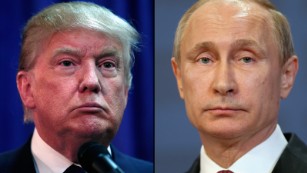
Will Trump's win boost US-Russia relations?
It's not that Russians want to destroy America, he says. "America lies deep in this nation's inferiority complex. It's the route to channel this understanding that we have not achieved what we wanted ... what we aspired to for that many years and we basically failed."
"It's anger and anger is a feeling that you can easily manage," Fishman explains. "A foe can turn into a partner. And that's why it's so easy to turn it around."
Donald Trump could become Russia's -- and Putin's -- best friend ... or not. And regardless of how it all turns out, Russia's state media can pivot, again.
"It can easily turn back," Fishman says, "and I would say this is very, very possible."
READ MORE: Putin says Trump agrees US-Russia ties must improve
On Kamergersky street, I asked Lyudmila, a homemaker from the Siberian city of Novosibirsk, whether she thinks relations with the US will improve under President Trump.
She answers slowly, and carefully. "We will see. We will see how things develop. How can I trust that things will be better? We will see."
News Courtesy: www.cnn.com

